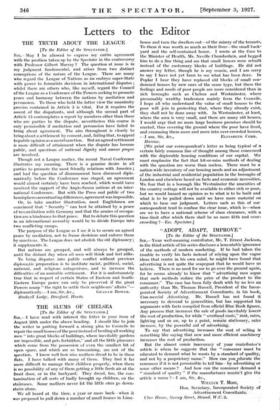Letters to the Editor
THE TRUTH ABOUT THE LEAGUE [To the Editor of the SPECTATOR.] SIR,-- May I be allowed to express my entire agreement with the position taken up by the Spectator in the controversy with Professor Gilbert Murray ? The question at issue is in my judgment fundamental, and arises from two distinct conceptions of the nature of the League. There are many who regard the League of Nations as an embryo super-State with power to formulate decisions in international disputes ; whilst there are others who, like myself, regard the Council of the League as a Conference of the Powers seeking to promote peace and harmony between the nations by mediation and persuasion. To those who hold the latter view the unanimity proviso contained in Article 5 is vital. For it requires the assent of the disputants, and although the second part of Article 15 contemplates a report by members other than those who are parties to the dispute, nevertheless this course is only permissible if mediation and persuasion have failed to bring about agreeinent. The aim throughout is clearly to bring about a settlement by consent, and, failing that, to appeal to public opinion as a moral sanction. But an agreed settlement is more difficult of attainment when the dispute has become public, and questions of national dignity and amour propre are involved.
Though not a League matter, the recent Naval Conference illustrates my meaning. There is a genuine desire in all parties to promote the most friendly relations with America ; and had the question of disarmament been discussed diplo- matically before the Conference was staged, an agreement would almost certainly have been reached, which would have received the support of the Anglo-Saxon nations at an inter- national Conference. But with the Press and public of two hemispheresaccentuating differences, agreement was impossible.
Or, to take another illustration, most Englishmen are convinced that " Security " can best be attained by a peace of reconciliation with Germany and that the armies of occupa- tion are a hindrance to that peace. But to debate this question in an international assembly would be to divide Europe into two conflicting camps.
The purpose of the League as I see it is to secure an agreed peace by mediation, not to frame decisions and enforce them by sanctions. The League does not abolish the old diplomacy; it supplements it.
But nations arc grouped, and will always be grouped, until the distant day when all men will think and feel alike.
To bring disputes into public conflict without previous diplomatic preparation is to institute racial, political, social, national, and religious antagonisms, and to increase the difficulties of an amicable settlement. For it is unfortunately true that in respect of certain States of Eastern and South- Eastern Europe peace can only be preserved if the great Powers usurp "the right to settle their neighbours' affairs "—
diplomatically.—Lam, Sir, &c., GRAHAM BOWER. Studied]] Lodge, Droxford, Hants.










































 Previous page
Previous page